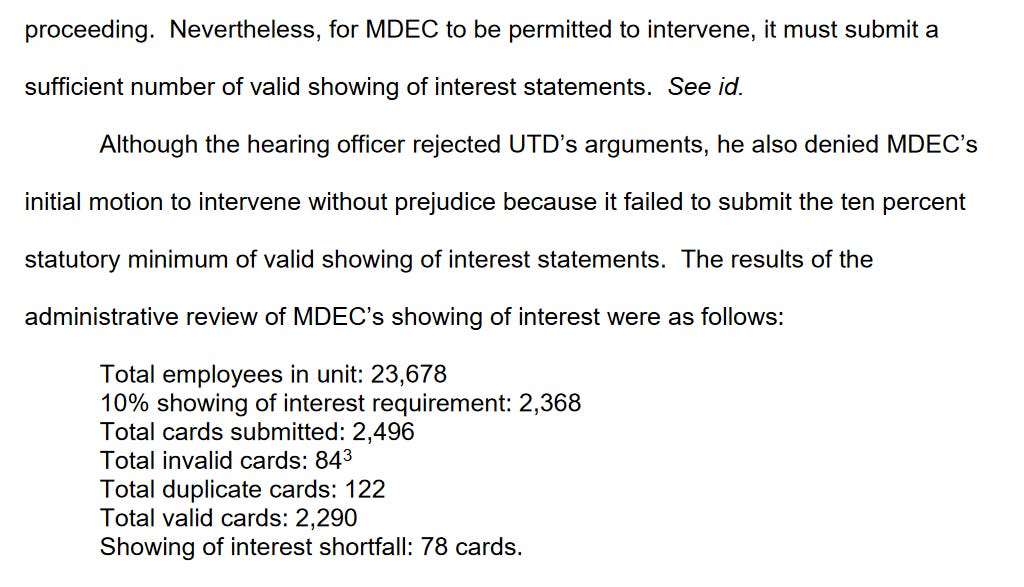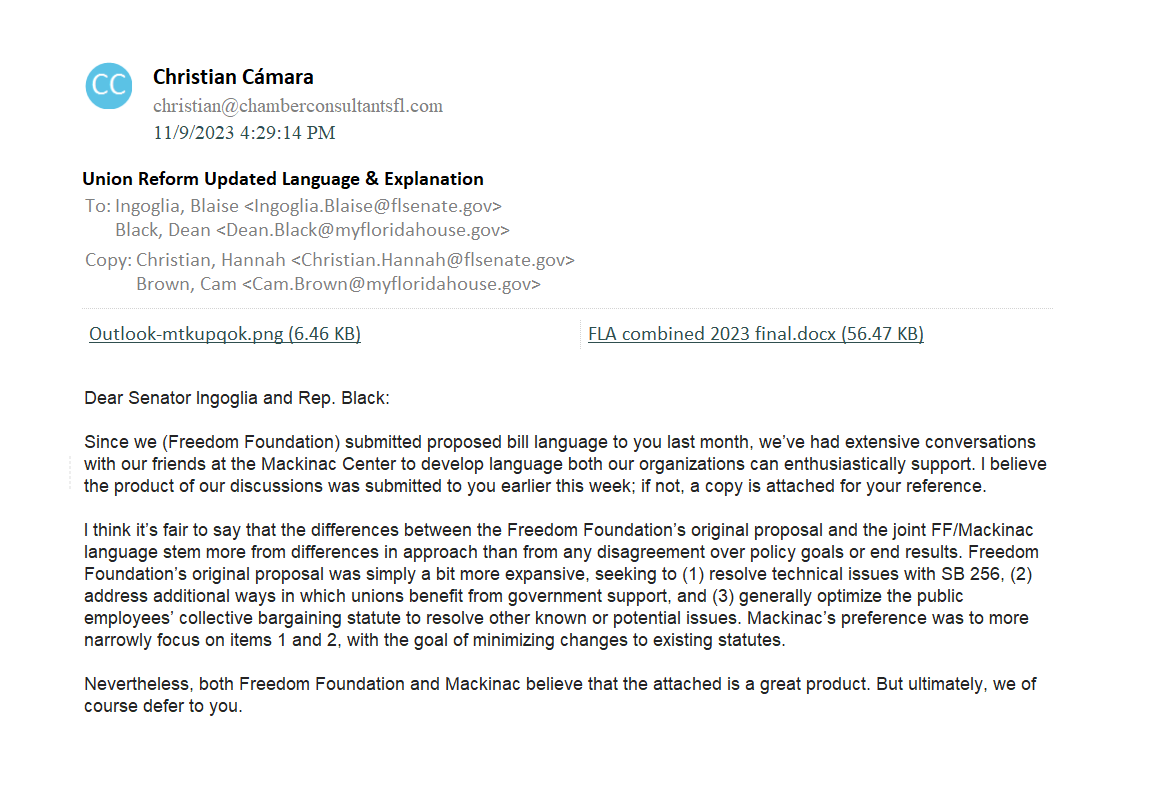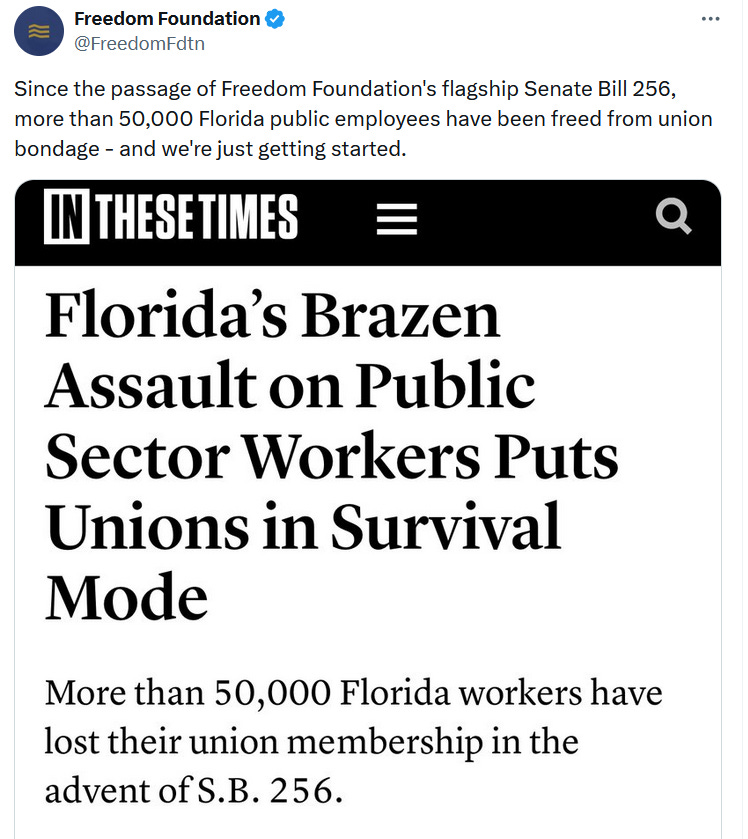A billionaire-backed group is trying to get rid of Florida's largest teachers' union
The Freedom Foundation, a Washington-based think tank, has helped finance a new union to replace the United Teachers of Dade (UTD) in Miami-Dade County.
A new teachers “union” that is reportedly financed at least in part by the anti-union Freedom Foundation will soon appear on the ballot with the United Teachers of Dade, an existing teachers union in Miami-Dade County that represents nearly 24,000 public school educators and school staff.
United Teachers of Dade, the largest local teachers union in the state, was recently forced to petition the state for an election to recertify — essentially, to remain formally recognized as a bargaining agent — due to consequences of a state law in Florida approved last year.
Specifically, the union was forced to petition for recertification after reporting less than 60% dues-paying membership in annual paperwork—a threshold they're now required to meet under Florida law to remain certified. The new “union” — the Miami Dade Education Coalition — boasts itself as a viable alternative that wants to replace United Teachers of Dade.
State records show the organization officially registered with the state Public Employees Relations Commission (PERC) in February, with the backing of the Freedom Foundation, a right-wing think tank based in Washington that’s funded by billionaires. Brent Urbanik, a social studies teacher in a public magnet school in Miami-Dade County, is reportedly the new union’s president.
Unlike United Teachers of Dade, which was required gather cards in support of recertification from at least 30% of the thousands of school staff they represent, state law only requires “intervenors” like the Miami-Dade Education Coalition to gather 10% of signed cards to appear on the ballot with them.
According to state records, the new “union” failed to even do that...on the first try.
According to commission documents, MDEC submitted a little over 10% of cards from eligible employees earlier this year. Just over 200 of them, however, were identified by the Commission as invalid or duplicates.
So the state commission—led by three commissioners appointed by Republican Gov. Ron DeSantis—denied the organization’s effort to intervene in UTD’s recertification election.

So, MDEC tried again.
This time, the organization only submitted 11 invalid or duplicate cards.
But, sure, they made the cut.
The date of the recertification election (and low-key showdown) has yet not been scheduled—or, at least, hasn't been posted publicly—but the Freedom Foundation is already celebrating MDEC’s placement on the ballot as a victory, while actively misconstruing its process for getting there.
In a recent press release, the Washington-based organization inflated the new union’s success, boasting that MDEC gathered “far more” cards than they needed to get onto the ballot.
According to the Commission, the new union gathered only 13 cards more than the bare minimum they needed to appear on UTD’s ballot.
Broadly speaking, there are dozens of unions across Florida that have petitioned for recertification following the passage of last year’s Senate Bill 256, a sweeping anti-union bill that was over a decade in the making.
The law essentially makes it harder for workers to pay union dues, by prohibiting payroll dues deductions, while requiring more workers to do so in order for a union to remain certified. Membership information has to be reported to PERC annually.
Workers in at least a dozen bargaining units so far that reported less than 60% membership since the law took effect, including two teachers’ unions, have voted to recertify their unions through an election process.
This means they’re safe, at least for another year.
Some have managed to exceed the 60% threshold, or are one of the police, fire, or transit unions that are exempt. Others, largely representing largely state employees and municipal employees for local governments and public schools, have been abandoned. Although union representatives largely haven’t been willing to go on-record to explain why some units were abandoned, many of them had exceptionally low membership rates. You can venture to guess that saving them, therefore, would be a heavy organizing lift.
Following the decertification of a bargaining unit of blue-collar school staff for Volusia County public schools, Cathy Knowles, a former AFSCME Local 850 president in Daytona Beach, told me the local simply didn’t have the people to keep the union certified.
“When you don't have people [who] want to sign up to continue going, I mean, there's not a whole lot we can do,” Knowles shared candidly for an article I reported for Orlando Weekly in February.
She told me she planned to quit her job the day we talked on the phone. The organizing landscape in Florida is tough right now, and it’s unlikely to get much easier any time soon.
So far, more than 50,000 public sector workers have lost their union representation following the passage of the new law. The Freedom Foundation, which lobbied in favor of last year’s law and sent mailers to union members telling them to ditch their unions, hasn’t been shy in sharing its delight.
On X, formerly known as Twitter, the organization shared a screenshot of my recent article for In These Times on this fallout, declaring that these workers had “been freed from union bondage.”
“[W]e’re just getting started,” the organization added in a June 7 post.
Based on public email communications I pulled through a records request with the state House and Senate earlier this year, it’s clear they’re not lying.
It’s possible they might be referring to plans to push for similar policies in other states. Or, they may be planning to continue lobbying for a separate legislative wish-list of anti-union policies that their lobbyist emailed to the GOP sponsors of Senate Bill 256 last fall.
According to the emails I got through that records request, the Freedom Foundation has been coordinating their anti-union policy reform efforts in Florida with the Mackinac Center for Public Policy, a right-wing think tank headquartered in Michigan. The Mackinac Center, at least in Florida, has also been keeping tabs on labor stuff through a separate project they have, dubbed, “Workers for Opportunity.”

I wrote about this a little bit in a pretty extensive story I reported for Orlando Weekly earlier this year, but even that just touches the surface. I’m hoping to find a publication that would accept a more comprehensive story on those anti-union policies they’re pushing (let me know if you’re an editor interested in commissioning a story on this).
A few of them include:
Increasing financial penalties for public sector workers and unions who participate in, or facilitate, any strike activity (this is already illegal under Florida law, but the Freedom Foundation argues that the current penalty is outdated, since it hasn’t been changed for some time. They say this penalty needs to be adjusted for “inflation”)
Increasing the filing fee of unions’ annual registration renewal paperwork from $15 to $90 (also to adjust for “inflation,” according to the think-tanks’ documents).
A law that would prohibit public employers and unions “from disrupting educational activities and injecting labor disputes into the classroom by instigating or advocating support of or opposition to, in any positive manner, employee organization activities by students in grade school, high school, or institutions of higher learning during classroom time.” (Seems like they don’t want Florida to become California)
A ban on what they described as “captive audience meetings.” Not those manipulative anti-union meetings that employers will often hold with their workers (or hire union busters to facilitate) during organizing drives, but meetings between union reps and groups of workers. I spoke to Jennifer Sherer of the Economic Policy Institute briefly about this earlier this year, and she told me she doesn’t recall any instance in which a state or group has similarly misappropriated the term “captive audience meeting” in this way. But if you have ever come across this, let me know.
Etc….
None of that made it into a so-called “glitch” bill passed this year during the 2024 legislative session intended to “follow up on last year’s SB 256.
That glitch bill, sponsored by the same Republican sponsors of SB 256, largely just addressed concerns voiced by the cop and firefighters union over some confusion regarding their exemption from the new union regulations.
It didn’t really do much to help unions like United Teachers of Dade, one of the largest public sector unions in Florida, and the first public sector union to formally certify with the state back in 1975.
But it’s widely presumed that’s kind of the point. Florida Gov. DeSantis has made a point of targeting teachers’ unions, specifically, in his statements on last year’s law.
He’s also specifically targeted United Teachers of Dade. DeSantis recently took an opportunity to describe union leaders as “activists that double as union hacks,” according to the Florida Times-Union, framing UTD and teachers’ unions broadly as corrupt organizations.
Maybe DeSantis is still mad that UTD president Karla Hernandez-Mats decided to run on the ticket of DeSantis’ Democratic opponent Charlie Crist, during his relection campaign for governor in 2022.
The pair of Democrats, Crist and Hernandez-Mats, lost to DeSantis badly, but it’s been speculated that this (and DeSantis’ ambitions for higher office) nonetheless helped propel Senate Bill 256 past the finish line in 2023, ahead of DeSantis’ failed presidential campaign. Similar iterations of that bill had been proposed by state lawmakers in years past, without such luck.
A rank-and-file teacher in Miami-Dade County told me their recertification election for United Teachers of Dade is scheduled for August or September (despite DeSantis’ recent claim that it would occur this summer). Dozens of other recertification elections are also either scheduled, or pending (i.e. unions have filed petitions for recertification, but are likely waiting for PERC to move forward with the scheduling process).
The Commission has been so backlogged with work that it’s difficult to even guess when those unions can expect more information.
Of all the cases where public sector workers have been able to vote on whether to keep their unions in tact so far, all have voted in favor of doing so.
The problem is, if they’re still under 60% dues-paying membership next year, they’ll have to do the same thing again.






Republicans and their billionaire backed donors are looking to break unions. They want to diminish salaries and take away bargaining rights so everybody will work for lower wages while they get richer.
In the past 25 years since Governor Bob Graham, the standards and public teaching have gone into the tank. They also promote "collaborative learning" which in essence is student doing the teachers work - it's endless bad presentations - no reference checking - it's a disgrace.
If you want the newest and BEST way to learn (pretty much everything) it's BF Skinner Foundation. The lay person's intro is Karen Pryor - The Art of Teaching and Training.
Otherwise, Florida is a dumpster fire until we can knock out the republicans. WE must hold Tallahassee accountable.